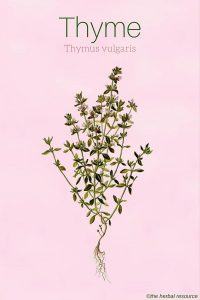The history of thyme as being in use as both a seasoning and a medicinal herb for goes back more than 3000 years.
Archaeologists have found ancient writings in Egypt discussing the use of it and it has been identified as one of the ingredients used in mummification.
Ancient Greeks considered it a symbol of style, elegance, and courage, and they used it as an incense to cleanse holy areas.
In Ancient Rome it was prized for its medicinal qualities and was used in the treatment of many ailments. It was also used by the Romans to “purify” their rooms.
In Europe, during the Middle Ages, thyme was grown in monasteries for use as a cough medicine, a remedy for intestinal parasites and as a digestive aid.
The origin of the word thyme probably goes back to either the Greek word, “thumus” which means “courage”, or from the Greek word “thymos” meaning “to perfume”.
The most active ingredient in the herb is thymol which has strong anti-bacterial properties and expectorant effect. In addition to thymol, thyme contains the flavonoids luteolin, apigenin, thymonin and naringenin which are antioxidants.
Thyme can be used for disinfection and it has antiseptic and antifungal properties.
It has been used as an herbal remedy against fungal infections like athlete’s foot and as a remedy for oral Candida (thrush) and other yeast infections.
It is also used to kill skin parasites such as crabs or head lice and internal parasites such as worms in the intestines. It is also been used as a natural mosquito repellent.
Some clinical trials have been conducted and confirm the effectiveness of thyme in treating bronchitis.
Additionally it thought to be beneficial for coughs and sore throat related to colds and flu as well as whooping cough. This is because the active constituents of thyme are known to loosen and expel mucous.
Traditionally the herb has been used to treat anemia, fever, intestinal problems and as an herbal remedy for halitosis.
It is thought to be good for colic, flatulence as well as an herbal hangover remedy.
Recent studies have also suggested that it may be helpful in the prevention of blood clots.
The essential oil of thyme is one of the most important oils in aromatherapy. It is used to boost the mind, spirit, and body.
The vapor from the essential oil is used to treat exhaustion, headaches, and depression as well as upper respiratory complaints, skin and scalp irritations and to prevent warts.
The essential oil is used in commercial toothpastes, mouthwashes and in a number of liniments and creams used in the topical treatment of arthritis, gout and rheumatism.

Leave a Reply